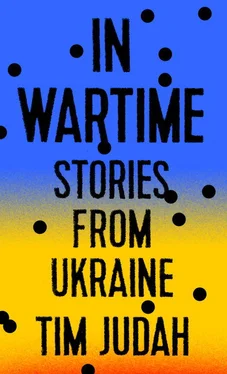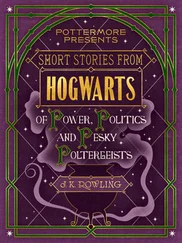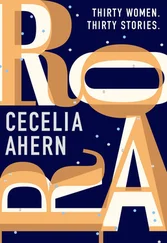A signal that the policy had changed was Ruslan’s arrest by the SBU in September 2010, which under Yushchenko had opened its archives to him. He was interrogated for fourteen and a half hours and a case against him was instituted, he told me, “for collecting information that was a state secret with the aim of passing it on to third parties. So, I was accused of spying.” The case was closed in 2012 for “lack of a crime.” According to him, colleagues were threatened and scared. The fact that a historian investigating Soviet crimes first had the archives opened to him and, when the policy changed, was arrested, only goes to show just how sensitive these issues are to this day. Indeed, now the pendulum has swung again. In May 2015 President Poroshenko signed into law two acts passed in April by the Verkhovna Rada. One banned communist and Nazi propaganda, meaning it would be illegal to deny, “including in the media, the criminal character of the communist totalitarian regime of 1917–91 in Ukraine.” The second criminalized denying the legitimacy of “the struggle for the independence of Ukraine in the twentieth century,” including the role of the OUN and UPA.
Before signing the law some seventy scholars of Ukraine, mostly but not only in the West, signed an open letter to Poroshenko asking him to veto the acts. They had been passed with little or no debate. “The potential consequences of both these laws are disturbing,” they argued:
Not only would it be a crime to question the legitimacy of an organization [UPA] that slaughtered tens of thousands of Poles in one of the most heinous acts of ethnic cleansing in the history of Ukraine, but also it would exempt from criticism the OUN, one of the most extreme political groups in western Ukraine between the wars, and one which collaborated with Nazi Germany at the outset of the Soviet invasion in 1941. It also took part in anti-Jewish pogroms in Ukraine and, in the case of the Melnyk faction, remained allied with the occupation regime throughout the war.
The scholars went on to argue that over the past fifteen years Vladimir Putin’s Russia had invested “enormous resources in the politicization of history,” and it would be “ruinous if Ukraine went down the same road.” The 1.5 million Ukrainians in the Red Army who died fighting the Nazis “are entitled to respect, as are those who fought the Red Army and NKVD.” If Poroshenko signed the laws it would be “a gift to those who wish to turn Ukraine against itself.”
They will alienate many Ukrainians who now find themselves under de facto occupation. They will divide and dishearten Ukraine’s friends. In short they will damage Ukraine’s national security, and for this reason above all, we urge you to reject them.
As soon as the laws were passed, pro-Russians were able to say that this was yet further proof that Ukraine was now run by neo-Nazis who had come to power as a result of an American- and European-sponsored coup. Headlines appeared in Western publications usually sympathetic to Ukraine reporting, for example, in the words of Leonid Bershidsky, a Bloomberg View columnist, that it was “goodbye Lenin, hello Nazi collaborators in Ukraine these days.” It was a baffling own goal by the president and the Verkhovna Rada.
12.
The Shtreimel of Lviv
In Lviv, the murders at the Lonskoho prison and the pogroms that followed were only the prologue. A ghetto was established to the north of the city and then a slave labor camp called Janowska in the northeast. Those Jews who did not die there were mostly sent to the Belzec death camp. Some managed to hide or were given refuge by non-Jewish friends. One of the most famous survival stories, recalled in a 2011 Polish film called In Darkness , tells the tale of a small group of Jews who survived in the sewers, where they were fed by Leopold Socha, a Polish sewer worker, his wife and a colleague. Ask people in Lviv about this story and you are almost certain to draw a blank. It is one that is remembered by Jews and maybe Poles, but more or less unknown to Ukrainians.
Some memorials were built in the 1990s but now more are planned—for example, one at the Janowska site and one at the rubbish-strewn and boarded-up site of the Golden Rose synagogue, built in 1582 and destroyed in 1943. Around it, in an area that was once Jewish, cafés and restaurants vie for the custom of tourists and locals alike. At the nearby Lviv Handmade Chocolate shop and café you can buy chocolate Putins, one version complete with devil’s horns.
There are few Jews left in Lviv, as many of those who lived here when the USSR collapsed subsequently emigrated. The community is looked after by Rabbi Mordechai Bald, whose wife, Sara, runs the small Jewish school. Twenty years ago, she told me, it had 180 children; now it has a stable sixty. On Shabbat, the Hassidic Rabbi Bald, who is American but has lived here since 1993, dons his big fur shtreimel hat and walks briskly home from synagogue. He told me that now there is not a single Jew left in Lviv whose origins are in the city. Once thousands would have been walking home on a Friday night in their shtreimels. Mostly he and his family have no problems, although there have been ugly incidents in the past.
In the meantime Ukraine’s tortuous relations with its Jews are changing. Close to the Golden Rose synagogue site a small exhibition has opened, purporting to be about Jewish life here in general. In fact it has a specific purpose, which is to highlight the number of Ukrainians who saved Jews, foremost among them the Greek Catholic Metropolitan Archbishop Andrey Sheptytsky (1865–1944). Two things have happened. The first is that some Ukrainians have woken up to the issue that—especially now that Ukraine needs all the friends it can get—courting Jews, particularly abroad, might be a good idea. Since they might well have been brought up on tales of how “the Ukrainians were the worst,” it might be a good idea to look for positive stories to tell. Secondly, those Jews that remain have become Ukrainian Jews rather than, for example, thinking of themselves as Russian Jews who live in Ukraine. Ukrainians and some Ukrainian Jews are at present campaigning hard to have Metropolitan Archbishop Sheptytsky included among the Righteous Among the Nations at the Yad Vashem memorial to the victims of the Holocaust in Jerusalem, where his brother Kliment has already been recognized, along with more than 2,000 other Ukrainians.
Sheptytsky is a fascinating and controversial figure. He was a staunch Ukrainian patriot and welcomed the Nazis because he thought they would be better than the Soviets and that their invasion would lead to an independent Ukrainian state. But Sheptytsky had been friendly to the Jews and was soon horrified by what began to unfold. So he ducked and weaved. He protested to Himmler about Ukrainians being used to kill Jews, and in November 1942 wrote his famous pastoral letter, “Thou Shall Not Kill,” which, although it does not mention the murder of Jews as such, is extremely clear by virtue of its time and context. Then he blessed the foundation of the SS Galicia Division, but at the same time was harboring some 150 Jews in monasteries and other buildings, including famously Rabbi David Kahane in his own palace in Lviv. Rabbi Kahane later became the chaplain of the Israeli Air Force and a staunch defender of Sheptytsky. So the issue of the Metropolitan Archbishop is a live one in the info-war and in the battle to win friends and influence people. As to the issue of the numbers of people rescued, the historian Frank Golczewski writes: “It suffices to realize that there were too many acts to make them irrelevant, yet too few to change the overall picture.”
Archbishop Andrey Sheptytsky, painting by Oleksa Novakivsky. Museum of Ethnography and Crafts. Lviv, November 2014.
Читать дальше












